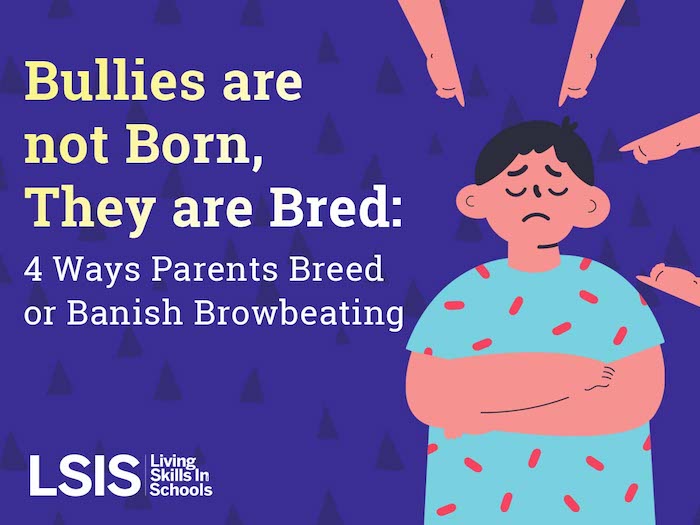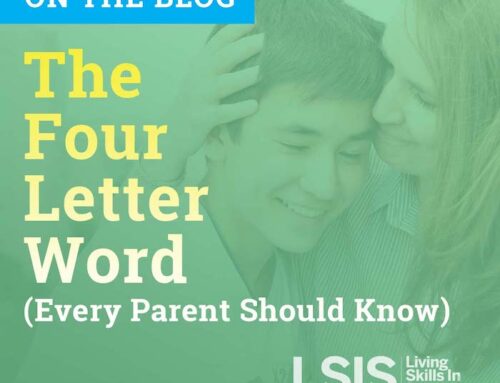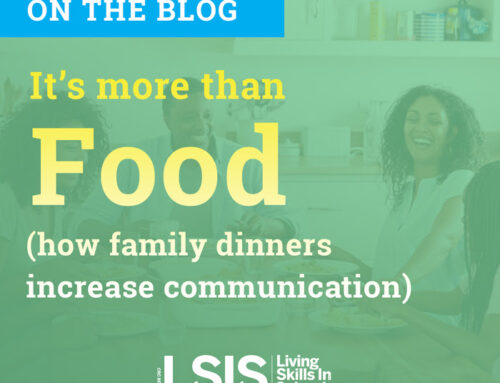
While these days anti-bullying campaigns, commercials, and fashionistas have helped bring a voice to the harmful and detrimental effects brought on by bullying, it’s what happens behind closed doors, in our homes, where the birth of empathy or the lack of it is initially learned. One of the most challenging and rewarding facets of parenting is understanding that our conduct, behaviors, and attitudes are the guideposts that teach our children right from wrong. How we treat ourselves and others is the number one way they form their ideals. Bullying is defined as one person seeking to harm or intimidate others they perceive as vulnerable. As parents, if we are unaware, we can unknowingly become the bullies we most fear our children will encounter or become.
There are pre-conceived notions of bullies as the tough, hard-skinned kids pouncing on their defenseless, accessible counterparts like the big kid stealing the smaller one’s milk money. However, these behaviors are sometimes much harder to spot and can occur where we least expect them. The best way to protect our children from becoming victims or perpetrators of mistreatment is to recognize where this learned behavior stems.
Below are four common emotions that lead to bullying.
Shame
Shame plays a significant role in bullying. A bully’s actions toward their perpetrator cause their victims to feel shame. More surprisingly, shame is usually one of the leading emotions driving the perpetrator. According to American research professor, lecturer, author, and podcast host, Dr. Brene Brown, shame is feeling flawed and unworthy of love, belonging, and connection. Shame is not a driver of positive change.
What Parents Can Do: The way we talk to ourselves matters. Instead of saying, “I am so stupid, I completely forgot I had that appointment today.” You say, “I missed that appointment today. It was stupid not to put it on the calendar.” Brown says the concentration is on the action, not the person. When we hear our children speaking to themselves in this way, we should be the first ones to stop them as well. Help them change their words around to the action and not themselves.
Insecurity
Insecurity and uncertainty in oneself are often correlated with bullying. Often, a bully will attack a trait or characteristic in an individual that they fear or worry they lack within themselves. For example, a bully might target a high achieving student if they are doing poorly academically. As a result, the person they injure verbally or physically may develop insecurities. They may start to formulate self-doubt or lose confidence within themselves.
What Parents Can Do: Parents can help their children and teens by helping build up their self-esteem. A great way to do this is by not just concentrating on the results of their accomplishments. Instead, parents can focus on the practice and work that it took their kids to get there. For instance, if your child put in extra hours on the soccer field but did not make the team, then let them know that their effort is what matters most. Remembering to praise ourselves in this way is also imperative. If you’re constantly making critical statements about your looks or competence, you’ll teach your child to do the same. Try to change your negative self-talk and tune into the things you say. This will help demonstrate to your child the importance of confidence and loving yourself.
Anxiety
When children and teens become victims of bullying, anxiety can begin to weigh heavy in all aspects of their life. The pain and distress victims experience can lead to extreme levels of isolation which can intensify their anxiety. The children who are bullying other children often suffer from anxiety as well. Many times the cause of their anxiety stems from their home life. Environmental stressors, including trauma, death, alcohol, drug addiction, or divorce, can lead children and teens to experience high anxiety levels.
What Parents Can Do: Parents can help their children cope with anxiety by becoming aware of how they respond to their children. If your child is anxious about changing their clothes in PE class or does not want to go to school, ask questions. Simply taking your child out of PE or allowing them to miss school will only exasperate their anxiety when they have to eventually face it. Get more information and help your child develop a game plan on how to deal with what’s bothering them.
Humiliation
There are many different forms of bullying, from physical bullying, verbal bullying to cyber-bullying. All of them can be linked by one common emotion, humiliation. When a person feels unjustly ridiculed or mortified by another person, consequences can be severe. During adolescence, when the need to blend in with peers is so great, being humiliated can be crippling. Extreme humiliation can cause teenagers to abandon their interests, stop pursuing goals, diminish their sense of self worth, and lead to mental health problems.
What Parents Can Do: One of the best ways to help our children deal with humiliation is to listen. Show empathy and compassion if they open up to you. Believe them if they tell you something happened and ask questions. Suppose they have not opened up but you suspect that something has happened, then set-aside time to talk. Reassure your child that you are there to support and help them. Stay calm and strategize about ways they can handle the situation. Knowing they have your support and are not alone is the central component in helping them.
As parents, we are our children’s primary role model in defining what constitutes acceptable or unacceptable behavior. How we speak up when we are mistreated or witness others being mistreated demonstrates to our children how to have the courage to speak up. Developing open and honest communication with our children is essential in cultivating empathy and defeating bullying behavior.
Carolina Droze is a LSIS presenter of K-5th programming, freelance writer and copywriter. She is also a mom, wife, surfer, nature enthusiast and a lover of loud music and dancing like she just don’t care.





